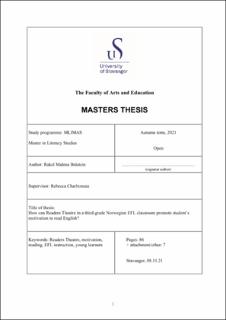| dc.description.abstract | This thesis is about how Readers Theatre in a third -grade Norwegian EFL classroom can promote student’s motivation to read English. Readers Theatre is a group activity where students rehearse a text and read it aloud in a group in front of the class. The study followed one class where Readers Theatre was implemented over a period of four weeks. The research questions aimed to find out how Readers Theatre can promote student’s motivation to read English and if RT can help the students develop positive attitudes towards reading English.
The findings are collected based on mixing of the two methods; qualitative and quantitative. Qualitative methods that has been used are observation, a pre- and a post-project interview with the teacher and two student group interviews. The quantitative method that was used was a questionnaire.
The study revealed that RT was an enjoyable and engaging reading instruction method. During the observation, the students seemed to be enthusiastic about the project. Some of the students were hesitant at first due to their low confidence in reading English. However, after repeated readings of the script, and support from their group, most of the students were confidently performing their script at the end of the project. Data from the questionnaire suggests that almost all of the students wanted to participate in another RT project. Data from the student group interviews showed that the students found the RT activity to be difficult at first, because they did not have a lot of experience reading in English. However, after practicing their scripts, their confidence in reading and performing in front of an audience increased as a result. The teacher claimed that she had a positive experience with RT and she believed her students did as well. The teacher agreed with the pupils and said that she wanted to use RT again and also introduce it to her collogues.
The main challenges of using RT concerned the logistics in preparing the project and finding appropriate rooms. In addition, the young students could not work as independently as the researcher thought, and the students were a bit noisy on occasions. Even though there was three teacher presents in the class at all times, this was still a challenge. If a teacher were to do an RT project alone, one could make adaptations to make it easier for them. Possible solutions could include that some of the students rehearse, and some do something completely different that they can do alone and then switch. | |
